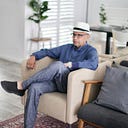Heavy Metal
Before electricity came along, ironing was a hard and tedious task.
Before light bulbs sprouted and wires snaked through walls, ironing was a sweaty dance in our sun-soaked village. There was no flick of a switch, just fire in a metal belly and a wooden handle worn by countless hands. My earliest memories smell like charcoal, the embers glowing like miniature suns in our ancient iron. Mother’s touch, careful and warm, filled it with glowing charcoals, while Father, in his Sunday best, pressed wrinkles flat like samurai conquering battlefields.
“Careful, son. Don’t burn yourself,” Father said as he handed me the iron. “You have to press firmly but not too hard. And move it slowly, but not too slow. It’s a delicate balance, like life itself.”
I nodded, trying to imitate his movements. The iron felt heavy and hot in my hand, and I could hear the fabric hiss and crackle under it. I looked at Father’s face, calm and focused, and wondered if he ever got tired of this chore.
Ironing wasn’t just about clothes but a family saga whispered in steam and sizzle. We learned the art — Father guiding my hand, whispering of pressure and heat that tamed creases into surrender. But the village laundryman, a sun-baked man with a smile wider than the sky, wielded a different beast. His double-size iron roared like a dragon, sweat on his brow sparkling like morning dew. Each press on Father’s khaki pants, a wrinkle-slaying war cry.
“Look at him go,” Father said, pointing at the laundryman. “He’s a master of his craft. He can iron anything, from silk to khaki, and make it look brand new. He’s been doing this since he was a boy, just like me. And you, someday.”
I watched the laundryman, his arms moving with grace and strength, his face shining with pride and joy. He seemed to enjoy his work. I wondered if I would ever find something that made me happy, something that was more than just a chore.
Ironing, though tiring, was a shared song. Children’s laughter, women’s stories over steaming sarongs and school pants, and the quiet hum of a chore well done. Then, electricity, a whispered legend, finally flickered in our home. We, the village pioneers, bathed in the glow of a new fridge, our house, the neighbourhood ice cube distributor.
“Look, Mother, look!” I shouted as I ran into the house. “We have electricity! We have light! We have iced water.”
“This is amazing, son. This is a miracle. Your father can petition anybody. The whole village got electricity because of your father”, my mother responded.
And I, a teenager with sixty-five rupees clutched tight, became the messenger of change. At Abdul Rahim’s store, under Uncle Michael, our neighbour and store manager, I chose our new weapon: a sleek electric ron from the Land of the Rising Sun. It promised effortless victory, wrinkles banished with a simple switch. As I held it, light as a feather, I knew, with a bittersweet pang, that the old ways were fading.
“Are you sure you want this, son?” Uncle Michael asked as he wrapped the iron in brown paper. “It’s a fine piece of technology but also expensive. And it’s not the same as the old irons. It’s easier also colder, less personal, less alive.”
I nodded, feeling a twinge of guilt. I knew he was right, but I also knew I wanted this. I wanted to try something new, something different, something modern. I wanted to be part of the change, not the past.
“Thank you, Uncle Michael. Thank you for everything..”
He smiled, then handed me the iron.
“Take care, son. And don’t forget where you came from, a boy from Mudiyansegewatta”.
The ancient irons, silent now in this photo, whisper of a time when sweat was the currency of crisp clothes, family the rhythm, and every chore a thread woven into the rich tapestry of our lives. I look at them and feel a mix of nostalgia and gratitude. They taught me many things and gave me a choice — embracing the new or cherishing the old. A choice to iron or to live.
Subscribe to my stories https://djayasi.medium.com/subscribe.
Images belong to the original owners.
